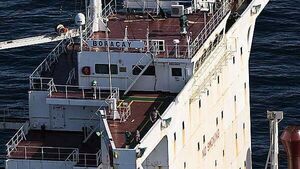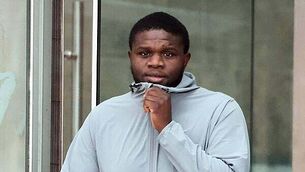Ireland not equipped to deal with threat of shadow fleet, says expert

Ottoline Spearman
Ireland is not equipped to deal with the multiple threats from the Russian shadow fleet, an expert has said.
Defence and security analyst Declan Power told BreakingNews.ie that Ireland has a "limited means to monitor" the shadow fleet, which has been seen multiple times sailing in Irish waters and in Ireland's Exclusive Economic Zone (EEZ) this year.
In 2025, 469 shadow fleet vessels were reported off the coast of Ireland.
The threats from the shadow fleet are numerous and could involve reconnaissance activities, sabotage, disrupting energy pipelines and communications cables, and environmental consequences from oil spills.
"Ireland is seen as a wobbly point," Mr Power said. "Russia may feel that it can push the concept with Ireland, as we are not configured for dealing with something like this."
One of the issues for Ireland is that it does not yet have sonar equipment, which would allow for the monitoring of the seas and enable the detection of these vessels.
In September, Tánaiste and Defence Minister Simon Harris told the Oireachtas that the Government had approved a project that will invest in sonar capability, but it is unclear when this equipment will be acquired.
"We need sonar equipment, and we need to man the vessels we have," Mr Power said. "Recruitment and retention in the naval services is the problem.
"Pay and conditions in the naval services trail far behind private-sector competition. The naval services are a far less attractive option for a lot of people."
Mr Power also warned that Ireland's underwater infrastructure is deeply vulnerable. Ireland’s exposure is tied to its energy system, with a significant portion of the country's electricity coming from abroad.
Disrupting the energy pipelines could be as simple as a ship "dragging an anchor across them", said Mr Power, as the pipes are not too deep in the ocean, and are wider and "easier to damage" than fibre optic cables.
“Eighty per cent of our electricity interconnector goes to Scotland, and our gas comes from Norway. Ireland’s energy security is interdependent with the UK and France.”
Mr Power stressed that even a small incident could have broad consequences: “What happens if our energy systems are affected? We have seen post-Storm Eowyn the consequences when infrastructure goes down.”
With the new Maritime Security Strategy set to be announced by the end of this year, Mr Power sees an opportunity.
“We are in a position to wake up and develop new infrastructure," he said. "But we shouldn't seek to waste money on things we don't need that other countries can do better."
“We need to take responsibility for our own backyard and fund that accordingly. We need to coordinate efforts with the UK and develop a unilateral way of handling intelligence and security."





